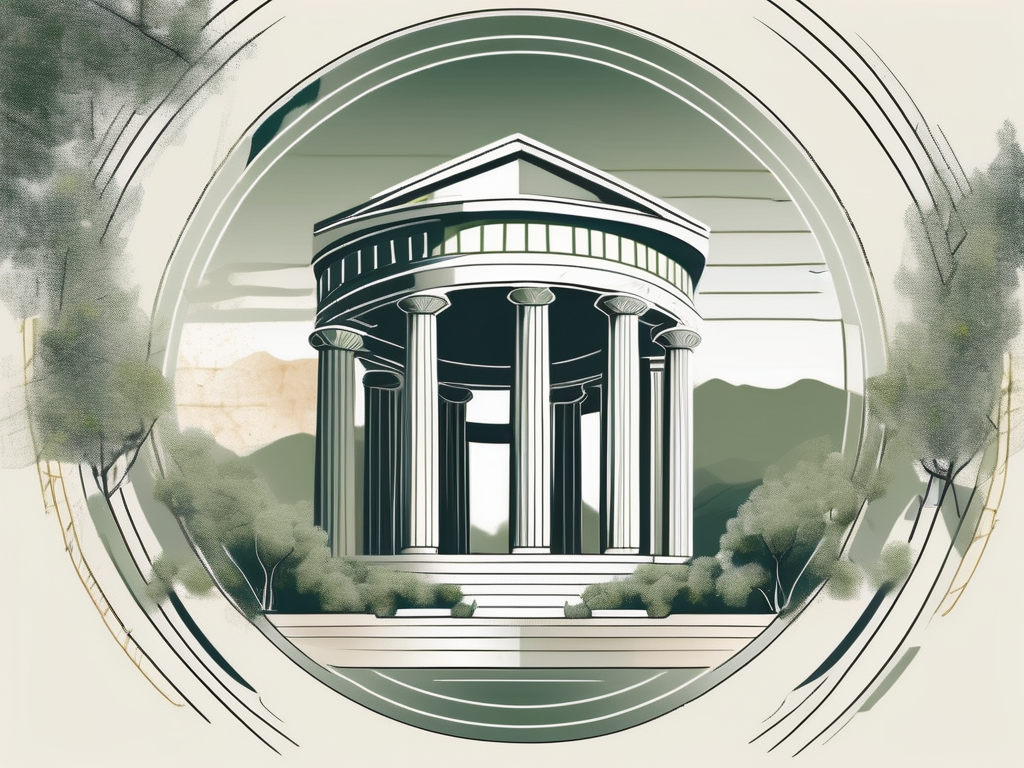Stoicism, an ancient philosophy that originated in ancient Greece, has seen a resurgence in popularity in recent years. This article aims to explore the core beliefs of stoicism, as well as its perspectives on various aspects of life. By understanding what stoics believe, one can gain valuable insights into this philosophical approach to living a fulfilling and meaningful life.
Understanding the Philosophy of Stoicism
Before delving into the specific beliefs of stoicism, it is important to gain a general understanding of this philosophical school of thought. Stoicism was founded in Athens by Zeno of Citium in the early 3rd century BC. It places an emphasis on virtue, reason, and natural order.
Stoicism teaches that individuals have control over their own thoughts, emotions, and actions, and that by cultivating virtue and living in accordance with nature, one can attain true happiness and fulfillment.
The Origins of Stoicism
The philosophy of stoicism traces its roots back to ancient Greece. Zeno of Citium, the founder of stoicism, was inspired by various philosophical schools such as Cynicism and Socrates’ teachings. Over time, stoicism evolved and found prominence in Rome, where it influenced great thinkers like Seneca, Epictetus, and Marcus Aurelius.
Stoicism gained popularity in Rome due to its practical approach to life’s challenges. The stoics believed that by focusing on what is within our control, we can navigate the complexities of the world with a sense of calm and resilience. This resonated with many Romans who faced constant political turmoil and personal hardships.
Seneca, one of the most well-known stoic philosophers, was an advisor to Emperor Nero. He used stoic principles to guide his own life and wrote extensively about the philosophy, providing practical advice on how to live a virtuous and fulfilling life.
Key Principles of Stoicism
Stoicism is characterized by several key principles that underpin its beliefs and practices. First and foremost is the notion that we should focus only on what is within our control, while accepting and letting go of what is beyond our control. This principle leads to a sense of inner peace and freedom from unnecessary worries.
By recognizing that external events are not under our control, stoics advocate for a shift in focus towards internal qualities and virtues. This allows individuals to cultivate a sense of self-mastery and resilience, even in the face of adversity.
Another important principle of stoicism is the belief that we should live in accordance with nature. This means aligning one’s actions and intentions with the natural order of the universe, recognizing that everything that happens is part of a larger plan.
Stoics view nature as a source of wisdom and guidance. They believe that by observing and understanding the natural world, one can gain insights into how to live a virtuous and meaningful life. This connection to nature also fosters a sense of interconnectedness and humility.
Stoics also believe in cultivating virtue as the path to a good life. Virtue, in this context, refers to qualities such as wisdom, courage, justice, and self-control. By consistently practicing these virtues, individuals can lead a virtuous life and find fulfillment.
Epictetus, a stoic philosopher born in ancient Rome, emphasized the importance of practicing virtue in everyday life. He believed that true happiness is not dependent on external circumstances, but rather on one’s internal character and moral choices.
Living a virtuous life, according to stoicism, requires constant self-reflection and self-improvement. It involves examining one’s own thoughts, actions, and intentions, and striving to align them with the principles of wisdom, courage, justice, and self-control.
By embodying these virtues, stoics aim to cultivate a sense of inner tranquility and moral integrity. They believe that true fulfillment comes from living in harmony with one’s own values and principles, rather than seeking external validation or material possessions.
Stoic Beliefs about Life and Death
Stoics have a unique perspective on life and death, which influences their approach to various existential questions.
The Stoic philosophy, developed by ancient Greek and Roman philosophers, centers around the idea of living in accordance with nature and accepting the inevitable. Stoics believe that death is an essential part of the natural order and should be embraced rather than feared. This perspective on mortality has profound implications for how Stoics approach life and find meaning in their existence.
Stoic Views on Mortality
Stoics recognize that death is an inevitable part of life and view it as a natural process. Rather than fearing death, stoics believe in accepting it as a natural progression and embracing the present moment.
When faced with the certainty of death, Stoics emphasize the importance of living each day to its fullest. By acknowledging the transitory nature of life, individuals are encouraged to appreciate the value of time and make the most of their limited existence. Stoics understand that every moment is precious and should not be wasted on trivial matters or excessive worry about the future.
Furthermore, Stoics believe that death is not an end but a transformation. Just as nature undergoes constant change and renewal, so too does the human experience. Stoics find solace in the idea that death is a natural part of the cycle of life, and that their essence will continue to exist in some form even after their physical body ceases to function.
Stoicism and the Meaning of Life
Stoics understand that life itself does not inherently have meaning. Instead, they believe that individuals should create their own meaning by living a virtuous life and contributing to the collective good.
According to Stoic teachings, the pursuit of pleasure or material possessions is ultimately futile and does not lead to lasting fulfillment. Instead, Stoics advocate for a focus on what is within one’s control: their own thoughts, actions, and character. By cultivating virtues such as wisdom, courage, justice, and temperance, individuals can find purpose and fulfillment in their daily lives.
Stoics also emphasize the importance of contributing to the well-being of others and society as a whole. By acting in accordance with nature and the principles of virtue, individuals can make a positive impact on the world around them. This sense of purpose and the knowledge that one’s actions have a broader significance can bring a deep sense of meaning to life.
In conclusion, Stoics have a unique perspective on life and death that encourages individuals to embrace the inevitability of death and find meaning in the present moment. By accepting death as a natural part of the cycle of life and focusing on virtues and contributing to the collective good, Stoics strive to live a fulfilling and purposeful existence.
Stoicism and Emotions
One of the key tenets of stoicism is its approach to emotions. Stoics believe that emotions are not inherently good or bad but rather a product of our own judgments and interpretations.
Stoicism teaches us that emotions are not something that happen to us, but rather something that we create within ourselves. It is our own thoughts and beliefs that give rise to our emotional experiences. By recognizing this, stoics empower themselves to take control of their emotions and not be at the mercy of external circumstances.
The Stoic Approach to Happiness
Stoics argue that true happiness comes from within and is not reliant on external circumstances. Happiness, according to stoicism, is a state of mind that can be cultivated through the practice of virtue and the acceptance of what is beyond our control.
When we focus on cultivating our inner virtues, such as wisdom, courage, and justice, we are able to find a deep sense of fulfillment and contentment. Stoics believe that external events and possessions have no real power over our happiness. It is our own character and moral choices that determine our well-being.
This approach empowers individuals to find contentment and peace of mind, regardless of the external circumstances they may encounter. By shifting our focus inward and aligning our actions with our values, we can find lasting happiness that is not dependent on fleeting external factors.
Dealing with Negative Emotions in Stoicism
Stoics encourage individuals to examine their emotions and question the underlying beliefs and judgments that contribute to negative emotions such as anger, fear, or sadness.
By critically evaluating their thoughts and reframing their perspective, stoics aim to cultivate emotional resilience and minimize the impact of negative emotions on their well-being. They recognize that negative emotions often arise from irrational or distorted thinking, and by challenging these thoughts, they can gain a more balanced and rational perspective.
Stoics also emphasize the importance of acceptance and detachment. They understand that there are certain things in life that are beyond our control, and by accepting this reality, they are able to let go of unnecessary worries and anxieties. This does not mean that stoics become indifferent or apathetic, but rather they focus their energy on what they can control and accept what is beyond their influence.
In practicing stoicism, individuals learn to navigate through life’s challenges with equanimity and grace. They develop a sense of inner peace that allows them to face adversity with resilience and strength. Stoicism teaches us that emotions are not to be suppressed or ignored, but rather understood and transformed into sources of wisdom and growth.
Stoic Beliefs about Ethics and Virtue
Ethics and virtue play a central role in stoic philosophy, guiding individuals in their actions and interactions with others.
Stoicism, an ancient Greek philosophy founded by Zeno of Citium in the early 3rd century BCE, places great importance on the cultivation of virtue as a means to achieve a life of tranquility and fulfillment. Stoics believe that virtue is the highest good and that a virtuous life is the key to living in harmony with oneself and others.
The Role of Virtue in Stoicism
Virtue, in stoic philosophy, is not merely a set of moral rules or guidelines to follow, but rather a way of being and living. It is seen as the foundation for a well-lived life, providing individuals with inner peace and a sense of purpose.
Stoics strive to embody virtues such as wisdom, justice, courage, and self-control in their daily lives. Wisdom, the cornerstone of stoic virtue, involves the pursuit of knowledge, understanding, and rational thinking. Justice, on the other hand, entails treating others with fairness, equality, and respect. Courage is the ability to face challenges and difficulties with bravery and resilience, while self-control involves restraining one’s desires and impulses.
By consistently embodying these virtues, stoics aim to lead a moral and ethical life, aligning their actions and behaviors with their core values and principles.
Stoic Perspectives on Morality and Ethics
Stoicism places a strong emphasis on moral and ethical behavior, highlighting the need to treat others with kindness, fairness, and respect. Stoics believe that our actions should be driven by reason, guided by moral principles, and considerate of the well-being of others.
According to stoic philosophy, morality is not subjective or relative, but rather grounded in reason and natural law. Stoics argue that by aligning our actions with reason and adhering to ethical principles, we can live a life of virtue and contribute to the betterment of society.
Stoics view ethical behavior as a means to create a harmonious society, where individuals live in accordance with nature and work towards the common good. They believe that by cultivating virtue and practicing ethical principles, individuals can contribute to the overall well-being and flourishing of humanity as a whole.
Stoicism encourages individuals to reflect on their actions, to examine their intentions and motivations, and to strive for moral excellence. It teaches that by living a life of virtue, one can find fulfillment, contentment, and a deep sense of purpose.
In conclusion, stoic philosophy places ethics and virtue at the core of human existence. By embodying virtues such as wisdom, justice, courage, and self-control, stoics strive to lead a moral and ethical life, contributing to the betterment of society and finding inner peace and fulfillment.
Stoicism and Personal Development
Central to stoicism is the idea of personal development and the continuous improvement of oneself.
Stoic Practices for Self-Improvement
Stoics advocate for various practices that aid in self-improvement and personal growth. These may include practices such as journaling, reflection, meditation, and engaging in philosophical discussions.
By actively engaging in these practices, individuals can develop greater self-awareness, cultivate their virtues, and strengthen their resilience in the face of life’s challenges.
Stoicism and Resilience
Stoicism places a strong emphasis on developing resilience and the ability to face adversity with composure and equanimity. Stoics believe that by recognizing and accepting the inevitable hardships of life, one can respond to challenges in a practical and constructive manner.
Through the cultivation of resilience, stoics aim to navigate life’s ups and downs with grace and maintain their inner tranquility.
In conclusion, stoicism offers a unique philosophical perspective on life, emphasizing virtues, reason, and accepting what is within our control. By understanding stoic beliefs about life and death, emotions, ethics, and personal development, individuals can integrate these principles into their own lives and pursue a more fulfilling and meaningful existence.












